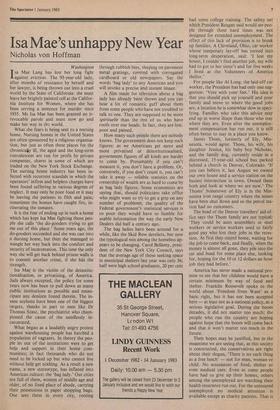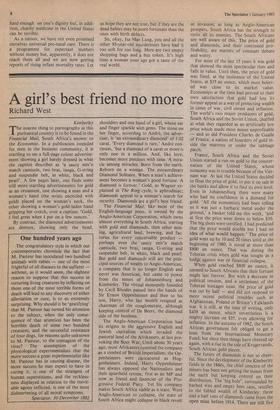Isa Mae's unhappy New Year
Nicholas von Hoffman
Washington
Isa Mae Lang has lost her long fight against eviction. The 93-year-old lady, after months of resistance by herself and her lawyer, is being thrown out into a cruel world by the State of California: she must leave her brightly painted cell at the Califor- nia Institute for Women, where she has been serving a sentence for murder since 1935. Ms Isa Mae has been granted an ir- revocable parole and must now go and make her way in the world.
What she fears is being sent to a nursing home. Nursing homes in the United States are often sponsored by a religious organisa- tion, but just as often these places for the chronicaloly ill, the aged and the long-term convalescent are run for profit by private companies, shares in some of which are traded on the New York Stock Exchange. The nursing home industry has been in- fected with recurrent scandals in which the operators' infirm and helpless charges have been found suffering in various degrees of neglect. It may only be poor food or it may be leaving the patients in filth and pain; sometimes the homes have caught fire, in- cinerating the inmates.
It is the fear of ending up in such a home which has kept lsa Mae fighting those peo- ple she calls 'the do-gooders trying to get me out of this place.' Some years ago, the do-gooders succeeded and she was cast into a nursing home, but then she managed to wangle her way back into the comfort and security of incarceration. This time the only way she will get back behind prison walls is to commit another crime, if she has the strength.
Isa Mae is the victim of the deinstitu- tionalisation, or privatising, of America. Jails always excepted, the policy for some years now has been to pull down as many public institutions as possible and eman- cipate any denizen found therein. The in- sane asylums have been one of the biggest targets, thanks in part to men like Dr Thomas Szasz, the psychiatrist who cham- pioned the cause of the needlessly in- carcerated.
What began as a laudably angry protest against warehousing people has hatched a population of vagrants. In theory the peo- ple let out of the institutions were to get help and support in their home com- munities; in fact thousands who do not need to be locked up but who cannot live without help get nothing. As a result a new name, a new stereotype, has inflated into American culture: the 'bag lady.° Our cities are full of them, women of middle age and older, of no fixed place of abode, carrying their possessions in paper shopping bags. One sees them in every city, rooting through rubbish bins, sleeping on pavement metal gratings, covered with corrugated cardboard or old newspapers. Say the words 'bag lady' to any American and you will invoke a precise and instant image.
A film made for television about a bag lady has already been shown and you can hear a lot of romantic guff about them from some people who have not troubled to talk to one. They are supposed to be more spirituelle than the rest of us who have roofs over our heads. In fact, they are lost, poor and pained.
How many such people there are nobody knows. The government does not keep such figures: as we Americans get more and more privatised or deinstitutionalised, government figures of all kinds are harder to come by. Presumably if you can't measure it, you don't have a problem. Or, conversely, if you don't count it, you can't take it away — reliable statistics on the ownership of wealth are as hard to come by as bag lady figures. Some economists are saying that, should politicians take office who might want to try to get a grip on any number of problems, the quality of the Federal government's statistical services is so poor they would have to fumble for usable information the way the early New Dealers did half a century ago.
The bag ladies have been around for a while, like the Skid Row derelicts, but now the typological mix among the homeless ap- pears to be changing. Carol Bellamy, presi- dent of the New York City Council, says that the average age of those seeking space in municipal shelters last year was only 36; half were high school graduates, 20 per cent had some college training. The safety net which President Reagan said would see peo- ple through these hard times was not designed for extended unemployment. The effect of this lack of provision is to break up families. A Cleveland, Ohio, car worker whose temporary lay-off has turned into long-term desperation, said: 'I lost my house, I couldn't find another job, my wife had to got to her sister's and for five weeks I lived at the Volunteers of America shelter.'
For people like Al Long, the laid-off car worker, the President has had only one sug- gestion: 'Vote with your feet.' His idea is that you should pick up yourself and your family and move to where the good jobs are, a location he is somewhat slow in speci- fying. Families who take this advice may end up in worse shape than those who stay where they are. Even after the unemploy- ment compensation has run out, it is still often better to stay in a place you know.
James Thom, formerly of Ely, Min- nesota, would agree. Thom, his wife, his daughter Jessica, his baby boy Nicholas, and the family dog, currently reside in a distressed, 15-year-old school bus parked behind a church in Denver, Colorado. 'If you can believe it, last August we owned our own house and a service station on the busiest intersection in town. Owned them both and look at where we are now.' The Thorns' .hometown of Ely is in the Min- nesota iron range country where the mines have been shut down and so the petrol sta- tion had no customers.
The head of the Denver travellers' aid of- fice says the Thom family are not typical: 'They could be auto assemblers or steel workers or service workers used to fairly good pay who lost their jobs in the reces- sion. At first they stayed home, waiting for the job to come back, and finally, when the money is almost all gone, they pile into the car and head for some place else, looking for, hoping for the 10 or 12 dollars an hour job they had before.'
America has never made a national pro- mise to see that her children would have a certain minimum by way of food and shelter. Franklin Roosevelt spoke to the world about 'Freedom from Want' as a basic right, but it has not been accepted here — at least not as a national policy, as a serious legislative goal. During the boom decades, it did not matter too much; the people who run the country are hoping against hope that the boom will come back and that it won't matter too much in the future.
Their hopes may be justified, but in the meantime we are seeing that, as this society is constructed, the conservatives are right about their slogan, 'There is no such thing as a free lunch' — not for man, woman or child. No assurances of food, shelter or even medical care. Even as some people have had to give up their homes, others among the unemployed are watching their health insurance run out. For the uninsured unemployed no medical attention is available except as charity patients. That is hard enough on one's dignity but, in addi- tion, charity medicine in the United States can be terrible.
As a nation, we have not even promised ourselves universal pre-natal care. There is a programme for expectant mothers without money but, apparently, it does not reach them all and we are now getting reports of rising infant mortality rates. Let us hope they are not true, but if they are the dead babies may be more fortunate than the ones with birth defects.
So, okay, Isa Mae Lang, you and all the other 93-year-old murderesses have had it too soft for too long. Here are two empty shopping bags and a bus token. It's high time a woman your age got a taste of the real world.



































 Previous page
Previous page